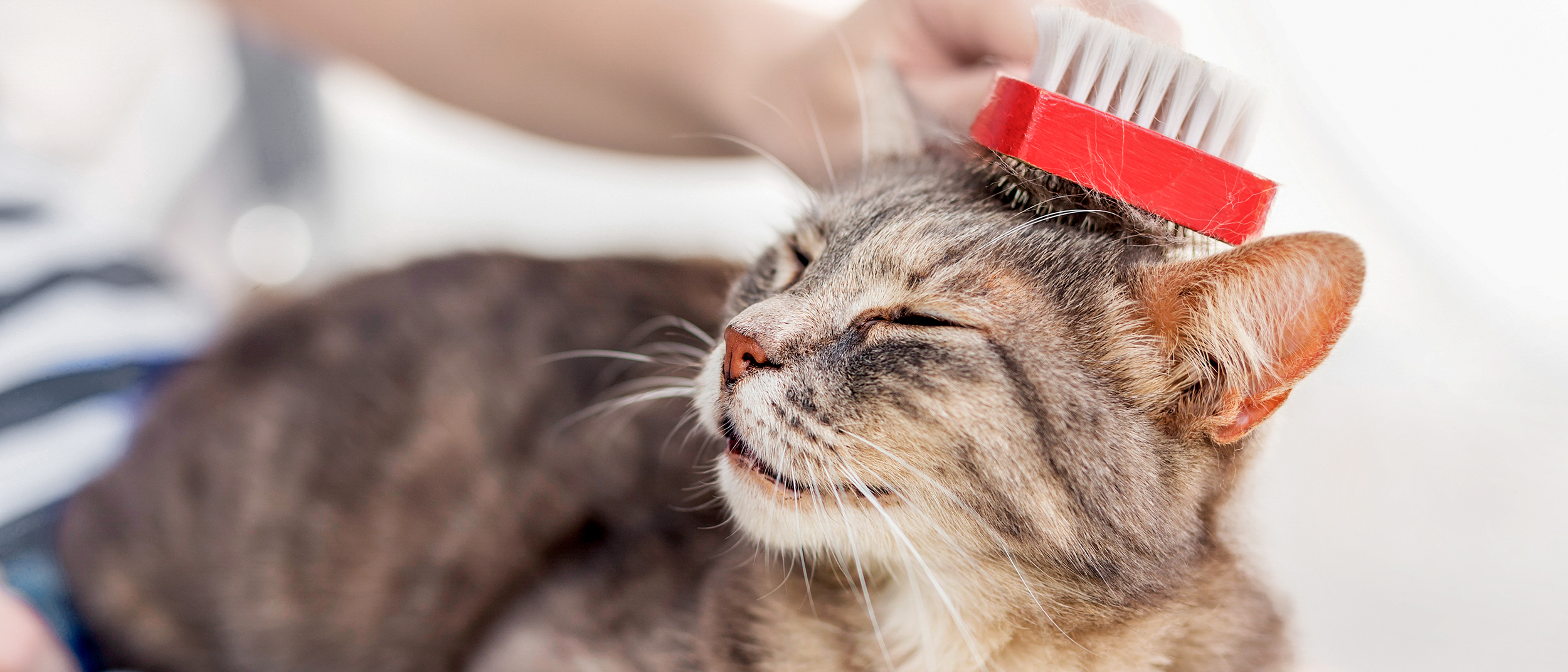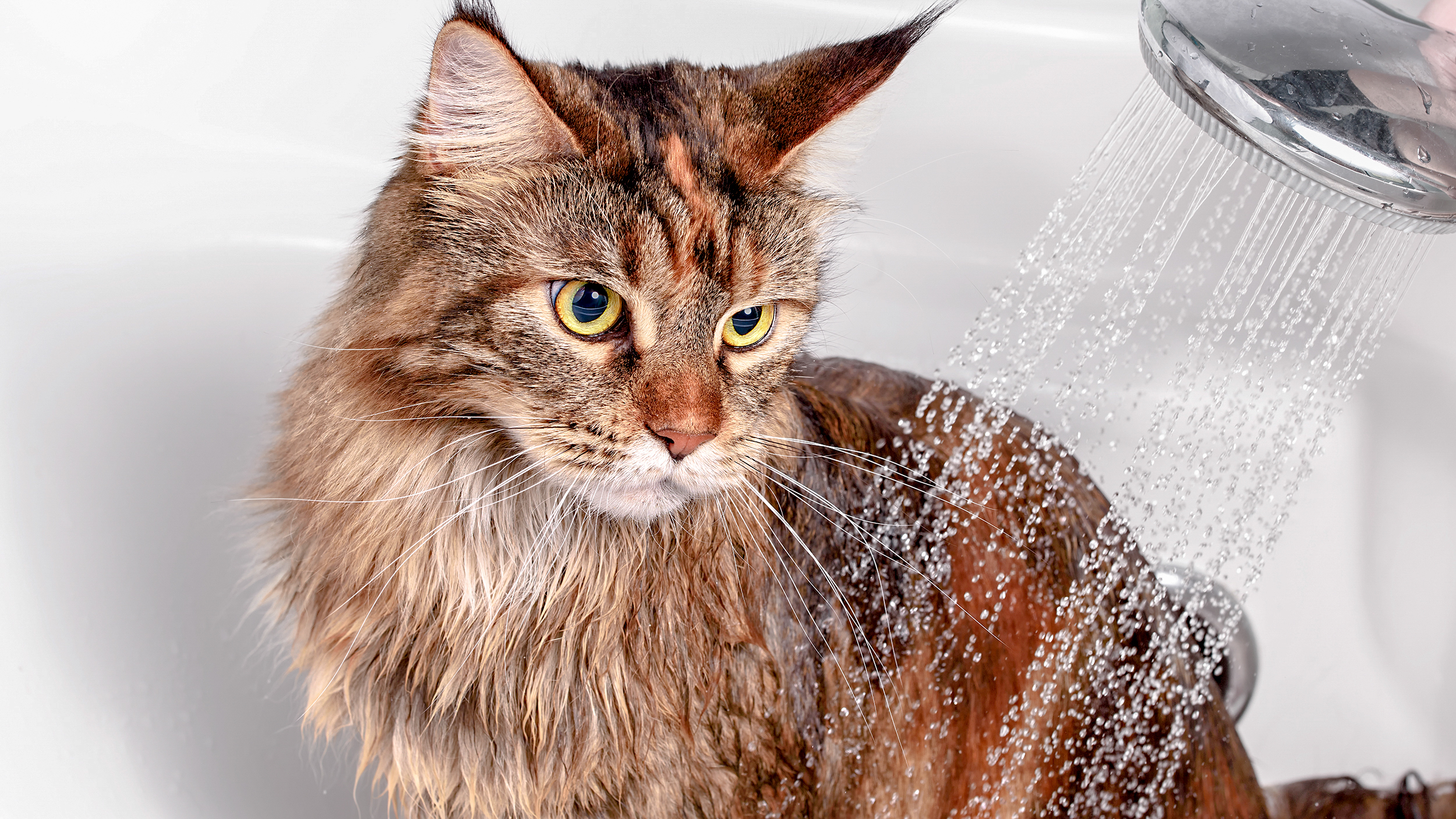Mẹo hữu ích cho việc vệ sinh và cắt tỉa lông móng cho mèo con

Mèo con dành nhiều thời gian khi mới thức dậy để tự chải chuốt, nhưng với tư cách là chủ vật nuôi, bạn cũng có vai trò và trách nhiệm trong việc cắt tỉa lông móng và vệ sinh cho mèo con.
Khi chăm sóc mèo con theo cách như vậy, bạn sẽ không chỉ hỗ trợ sức khỏe và cuộc sống của thú cưng mà còn hình thành một sự gắn kết thân mật.
Chăm sóc bộ lông của mèo con
Việc chải lông thường xuyên cho mèo con giúp bạn có cơ hội kiểm tra các loại ký sinh trùng như bọ chét và ve, đồng thời giúp ngăn ngừa các cục lông có thể tích tụ trong dạ dày mèo.
Cách chải lông cho mèo con
- Bắt đầu thật nhẹ nhàng để mèo quen với việc chải hoặc gỡ rối lông.
- Luôn chải lông cho mèo con xuôi theo và sau đó là ngược lại với chiều mọc của lông để nhẹ nhàng loại bỏ lông rụng và mọi cục lông rối nhỏ nhất.
- Nếu cục lông rối làm mắc lược chải, hãy nhẹ nhàng và kiên nhẫn thay vì kéo mạnh và làm tổn thương lông.
- Bạn nên kết thúc giờ chải lông bằng một trò chơi để khép lại mọi việc theo cách tích cực cho chú mèo con.
- Mùa xuân và mùa hè là mùa mèo thay lông, nên mèo cần được chải lông thường xuyên và kỹ hơn. Dùng một chiếc găng tay mát-xa cao su và chải để gỡ lông rụng dễ dàng hơn.
Cách chải lông cho mèo lông ngắn
Chải lông hàng tuần là đủ đối với mèo lông ngắn. Trước khi chải, bạn có thể đi găng tay chải lông và mát-xa ngược chiều mọc của lông để loại bỏ lông rụng và làm săn da. Nếu có thể, hãy dùng bàn chải mềm với lông bàn chải bằng tơ tự nhiên để tránh làm hư tổn lông.
Cách chải lông cho mèo lông vừa và mèo Ba Tư
Một vài phút chải chuốt mỗi ngày sẽ giúp mèo tránh được các cục lông rối và bụi bẩn. Trong trường hợp này, lược kim loại có răng thưa sẽ phù hợp hơn cả. Bạn nên dùng lược cẩn thận vì lược sẽ chải sâu hơn vào lớp lông so với bàn chải, tức là, nguy cơ gây kích ứng da sẽ cao hơn. Vì vậy, hãy nhớ dành thời gian chọn một chiếc lược phù hợp.
Hướng dẫn cắt móng vuốt cho mèo con
Mèo con dùng vuốt để đánh dấu lãnh thổ. Để tránh những hư hại do mèo cào mà không gây ảnh hướng đến hành vi tự nhiên của chúng, tốt nhất, bạn nên cắt móng cho mèo. Việc cắt móng hoàn toàn không gây đau đớn nhưng có thể làm mèo con lo sợ, vì thế, bạn nên bắt đầu sớm để mèo làm quen với việc này ngay từ khi còn nhỏ.
- Hỏi bác sỹ thú y – Trước khi bắt đầu cắt móng cho mèo, bạn nên nhờ bác sỹ thú y giải thích xem phần nào của móng là có thể cắt mà không gây đau và chảy máu.
- Đảm bảo rằng bạn và mèo đều cảm thấy thoải mái – Bắt đầu bằng cách chọn một chỗ ngồi thoải mái và đặt mèo con vào lòng bạn, giữ cơ thể mèo giữa hai đùi bạn. Giữa mỗi lần cắt, bạn nên vuốt ve bụng để dỗ dành mèo con.
- Kéo bấm móng là công cụ tốt nhất để cắt tỉa móng – Cắt phần đầu màu trắng của móng, cách xa phía cuối của phần tam giác màu hồng, đây là phần thịt ở đế móng (thịt mềm). Nếu cắt quá sát phần thịt mềm, bạn có thể làm mèo đau và chảy máu.
- Dành thời gian – Tốt nhất, bạn nên cắt từng chút móng một thành nhiều lần thay vì cắt một phần móng lớn.
Móng vuốt là một dấu hiệu khá đúng về sức khỏe của mèo con. Móng quá cứng hoặc quá mềm có thể là dấu hiệu của suy dinh dưỡng hoặc vi khuẩn tấn công, vì vậy nếu bạn nhận thấy một trong hai dấu hiệu này, hãy tham khảo ý kiến bác sỹ thú y.

Cách vệ sinh mặt cho mèo con
- Vệ sinh mắt cho mèo con – Ví dụ, một số chú mèo (có khuôn mặt phẳng) tiết nước mắt và có thể để lại vết dưới mắt. Bạn có thể vệ sinh phần lông dưới mắt bằng cách dùng miếng gạc y tế ngâm trong dung dịch dưỡng mắt và lau từ trong mí mắt ra ngoài.
- Vệ sinh mũi cho mèo con – Mũi của chú mèo con khỏe mạnh sẽ luôn ẩm và sạch sẽ. Một số chú mèo có dịch tiết ở bên trong lỗ mũi. Bạn có thể dễ dàng loại bỏ dịch tiết này bằng một miếng gạc hoặc khăn giấy được nhúng nước ấm.
- Vệ sinh tai cho mèo con – Bạn nên thường xuyên kiểm tra tai của mèo con. Nếu tai của mèo con bị bẩn, bạn chỉ cần nhỏ một ít dung dịch vệ sinh vào tai và xoa bóp phần tai bên ngoài.
Hãy tham khảo ý kiến của bác sĩ thú y để được chẩn đoán nếu bạn nhận thấy mèo có dịch tiết hoặc chảy nước ở mắt, mũi và tai. Vì khi đó, bác sĩ thú ý có thể đề xuất phương pháp điều trị thích hợp.
Chăm sóc và vệ sinh răng miệng cho mèo con
Răng sữa của mèo con sẽ bắt đầu mọc khi mèo được từ 2 đến 6 tuần tuổi. Bạn phải giữ gìn vệ sinh răng miệng cho mèo con vì tình trạng vệ sinh răng miệng kém có thể khiến mèo bị rụng răng, viêm nướu và hôi miệng.
- Đánh răng cho mèo con – Bạn nên sử dụng bàn chải đánh răng chuyên dụng và kem đánh răng thú y cho mèo. Để mèo con quen với việc đánh răng, hãy bắt đầu đánh răng cho mèo từ khi chúng còn nhỏ. Với sự kiên trì và thói quen đánh răng đều đặn, mèo con sẽ làm quen nhanh hơn.
- Ngăn ngừa tích tụ cao răng – Hãy chọn thức ăn khô giúp ngăn ngừa cao răng vì loại thức ăn này có kết cấu đặc biệt, chứa các chất giữ canxi trong nước bọt và làm chậm quá trình hình thành cao răng.
Nếu bạn lo lắng về tình trạng răng của mèo con, hãy trao đổi với bác sĩ thú y vì họ sẽ tư vấn và có thể dùng máy siêu âm để lấy cao răng cho mèo.
Cách tắm cho mèo con
Hầu hết mèo không thích nước nhưng tắm vẫn là một phần quan trọng đối với thói quen chải lông, vệ sinh cho mèo lông dài và mèo lông vừa. Vì vậy, bạn nên để mèo con làm quen với việc tắm ngay từ khi mèo còn nhỏ.
Bạn cần phải sử dụng dầu gội dành cho mèo, vì loại dầu gội này có độ axit phù hợp với da và lông của mèo (bạn không nên sử dụng dầu gội dành cho người vì loại dầu gội này có thể độc hại với mèo con).
1. Để mèo làm quen với nước một cách nhẹ nhàng nhưng kiên quyết
2. Dùng bông tắm để bắt đầu làm ướt mèo con. Nếu mèo con của bạn phản kháng với thái độ khó chịu, hãy dừng lại và thử lại sau vài ngày cho đến khi mèo con quen với nước
3. Kỳ cọ nhẹ nhàng để làm sạch lông, tập trung vào những vùng lông bị bẩn
4. Đổ nước có nhiệt độ 36 – 37°C vào đáy bồn tắm rồi nhẹ nhàng đặt mèo con vào trong bồn
5. Trấn an mèo con bằng lời nói nhẹ nhàng và vuốt ve mèo
6. Gội sạch hết dầu gội bằng cách nhẹ nhàng dội nước lên lưng mèo, chú ý tránh vùng mắt và tai của mèo
7. Quấn chú mèo con trong một chiếc khăn ấm áp và sạch sẽ. Bạn có thể dùng máy sấy chuyên dụng để sấy khô lông mèo hoàn toàn. Tuy nhiên, hãy nhớ sấy nhẹ nhàng, với mức nhiệt không quá cao và không để máy sấy quá gần với mèo.
Chải lông cho mèo con là một cách tuyệt vời để bạn gắn kết với thú cưng mới của mình, đồng thời góp phần chăm sóc sức khỏe và thể trạng của chúng. Chải lông cho mèo cũng giúp bạn hiểu rõ về da, mắt, tai, răng và bộ lông của mèo để bạn có thể nhận biết những điều bất thường. Nếu bạn nhận thấy những thay đổi đột ngột hoặc bất thường, hãy tham khảo ý kiến của bác sĩ thú y để nhận được lời khuyên và phương pháp điều trị mang tính chuyên môn.
Related Articles
Chế độ dinh dưỡng phù hợp với mèo con
Các công thức dinh dưỡng giúp hình thành sức đề kháng tự nhiên, hỗ trợ tăng tưởng khỏe mạnh và phát triển hệ tiêu hóa của mèo con.
Thích và chia sẻ trang này